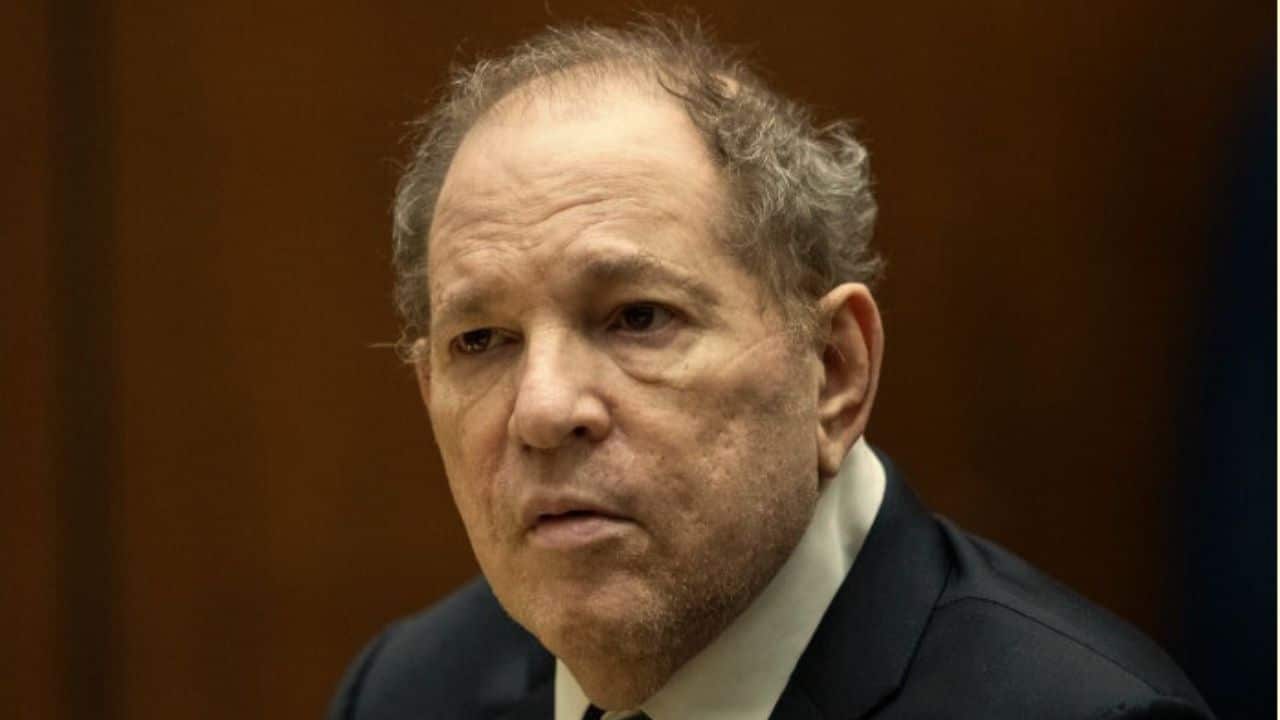Harvey Weinstein, the disgraced Hollywood producer serving a lengthy prison sentence for his sexual assault convictions, has been diagnosed with a serious health condition: chronic myeloid leukemia (CML), a type of bone cancer, according to a source close to the situation. Weinstein’s health has long been a subject of concern, and this latest diagnosis sheds further light on the challenges he is facing while incarcerated. The former movie mogul is currently receiving treatment at Rikers Island in New York, where he has been imprisoned since his conviction.
Weinstein’s Health Crisis: Chronic Myeloid Leukemia Diagnosis
Chronic myeloid leukemia (CML) is a rare form of cancer that originates in the bone marrow, the tissue responsible for producing blood cells. In patients with CML, the bone marrow generates an abnormal number of white blood cells, which then enter the bloodstream and can disrupt the body’s normal functions. If left untreated or if it progresses, CML can evolve into a more acute form of leukemia, which is much harder to manage and often has more severe health consequences. According to the American Cancer Society, CML is a relatively slow-growing leukemia, but it requires prompt treatment with targeted therapies to prevent it from becoming life-threatening.
In Weinstein’s case, the diagnosis has raised significant concerns about his long-term health, especially considering his already weakened physical condition. Weinstein’s health has been steadily deteriorating since his incarceration, with this latest cancer diagnosis adding to his growing list of serious medical issues. Sources have indicated that Weinstein’s condition is being closely monitored by medical professionals at Rikers Island, and he is receiving the necessary treatment to manage the disease. However, the specific details of his treatment regimen have not been publicly disclosed.
Privacy Concerns Surrounding Weinstein’s Health Disclosure
Despite the gravity of Weinstein’s diagnosis, there has been controversy surrounding the public disclosure of his medical condition. Craig Rothfeld, Weinstein’s prison consultant and authorized legal health care representative for the state of New York, issued a statement criticizing the fact that Weinstein’s private health matters have become public knowledge. Rothfeld expressed frustration that such personal information had been leaked to the media, stating, “It is both troubling and unacceptable that such private and confidential health matters have become a subject of public discourse.”
Rothfeld emphasized that out of respect for Weinstein’s privacy, neither he nor Weinstein’s legal team would be making further comments on his health. He called for privacy and dignity as Weinstein navigates this serious medical situation. Despite these calls for privacy, Weinstein’s health has remained a topic of widespread public and media interest due to his high-profile status and the nature of his criminal convictions.
Weinstein’s Legal Team Silent on Cancer Diagnosis
While Weinstein’s prison consultant has spoken out about the issue of privacy, Weinstein’s legal team has remained silent on the matter. Juda Engelmayer, Weinstein’s longtime spokesperson, declined to comment on his health status when contacted by CNN. Similarly, Arthur Aidala, one of Weinstein’s attorneys, did not immediately respond to requests for comments on the diagnosis or whether it would have any impact on Weinstein’s upcoming legal battles.
The silence from Weinstein’s legal team has only fueled speculation about how his health condition might affect his ongoing court cases. With multiple legal challenges still ahead of him, including a retrial in New York that could further determine the length of his sentence, questions remain about whether Weinstein’s health issues could lead to delays or modifications in the legal proceedings.
A History of Health Struggles: Weinstein’s Medical Complications in Prison
Weinstein’s cancer diagnosis is just the latest in a series of serious health complications that have plagued him during his time in prison. In addition to his chronic myeloid leukemia, Weinstein has been dealing with multiple other medical issues, which have been a point of concern for both his legal team and prison officials. Just last month, the 71-year-old underwent emergency heart surgery after experiencing a health crisis that required him to be rushed to Bellevue Hospital in New York.
Weinstein’s representatives confirmed that he had undergone a heart procedure, though they did not elaborate on the specifics of the surgery. After spending a brief period in the hospital, Weinstein was released and returned to Rikers Island. His spokesperson stated at the time, “As we have extensively stated before, Mr. Weinstein suffers from a plethora of significant health issues that need ongoing treatment.” The emergency heart surgery highlighted the extent to which Weinstein’s health has declined since his incarceration, and the added complication of chronic myeloid leukemia has only intensified concerns about his well-being.
In addition to his heart problems, Weinstein has been reported to suffer from other conditions such as high blood pressure, diabetes, and severe back issues, all of which have compounded his health struggles. These conditions have been cited by his legal team in past court appearances as reasons for leniency, but they have not swayed the courts thus far.
Weinstein’s Ongoing Legal Battles
Despite his serious health challenges, Weinstein’s legal troubles continue to mount. In recent months, he has been fighting additional criminal charges related to sexual assault, and his legal team is preparing for what could be a pivotal retrial in New York. Earlier this year, Weinstein’s 2020 conviction, which had marked a significant victory for the #MeToo movement, was overturned by an appeals court. This decision opened the door for a retrial, and Weinstein is tentatively set to return to court on November 12, 2024, for further proceedings.
The retrial could have major implications for Weinstein’s legal future, as prosecutors are seeking to combine multiple cases into a single trial. This would streamline the legal process and allow the courts to hear all of the outstanding charges against Weinstein at once. However, Weinstein’s defense team has strongly objected to this approach, arguing that it would be unfair to lump all of the accusations together in a single trial. The legal battle over whether the cases will be combined is ongoing, with Weinstein’s defense team actively fighting to keep the cases separate.
Weinstein’s health has also played a role in his legal strategy, with his attorneys previously citing his medical issues as a reason for seeking delays or modifications in his court schedule. However, the courts have shown little inclination to grant Weinstein any special accommodations due to his health, and it remains unclear whether his cancer diagnosis will have any impact on his upcoming retrial. When asked whether the trial might be delayed due to his diagnosis, Weinstein’s spokesperson, Juda Engelmayer, declined to comment.
Understanding Chronic Myeloid Leukemia
Chronic myeloid leukemia, the condition Weinstein is battling, is a rare form of blood cancer that primarily affects adults. According to the American Cancer Society, CML begins in the bone marrow, where blood cells are produced. In patients with CML, the bone marrow produces too many white blood cells, which then accumulate in the blood and can cause serious health complications if left untreated.
While CML is not as common as other forms of leukemia, medical advancements have greatly improved treatment options for patients with the disease. Targeted therapies, which specifically attack cancer cells without harming normal cells, have been developed in recent years and have significantly increased survival rates for CML patients. However, the disease still requires careful monitoring and long-term treatment to prevent it from progressing to a more dangerous form of leukemia.
CML is typically diagnosed through blood tests and bone marrow biopsies. Symptoms can include fatigue, weight loss, fever, and night sweats, though many patients do not experience noticeable symptoms in the early stages of the disease. Treatment for CML often involves the use of tyrosine kinase inhibitors (TKIs), a type of medication that blocks the abnormal proteins produced by cancer cells. These medications can help control the disease and prevent it from advancing.
Despite the availability of effective treatments, chronic myeloid leukemia is still a serious condition that can lead to significant health complications if not properly managed. Studies have shown that between 15% and 30% of patients with CML eventually develop acute myeloid leukemia (AML), a more aggressive form of the disease that is much harder to treat. Acute leukemia often requires more intensive treatment, including chemotherapy or bone marrow transplants, and has a lower survival rate than chronic leukemia.
The Road Ahead for Weinstein
As Weinstein battles chronic myeloid leukemia, his legal and health challenges seem to be converging at a critical moment. The outcome of his retrial could determine whether he spends the rest of his life in prison, and his health condition adds a layer of uncertainty to the proceedings. While Weinstein’s legal team has remained tight-lipped about how his cancer diagnosis will affect his court appearances, it is clear that his health is deteriorating rapidly.
For now, Weinstein remains under the care of medical professionals at Rikers Island, where he is receiving treatment for his leukemia. His future, both in terms of his health and his legal battles, remains uncertain. As the retrial date approaches, all eyes will be on how Weinstein’s health evolves and whether it will impact his ability to stand trial once again.
Harvey Weinstein’s recent diagnosis of chronic myeloid leukemia adds another chapter to his ongoing saga of legal and health struggles. With his health rapidly declining and his retrial looming, the former Hollywood powerhouse faces an uncertain future. While his legal team continues to prepare for court, Weinstein’s health condition will likely play a significant role in shaping the final outcome of his case. For now, Weinstein’s representatives are calling for privacy as he undergoes treatment, but public interest in his fate shows no signs of waning.





































